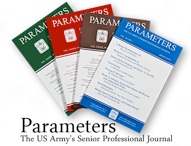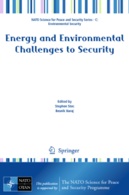

Much has changed in the field of environmental security since its infancy in the early 1990s. We offer services that far surpass the simplistic, linear concepts that only focus on trends. Instead, our approach embraces the complexity and uncertainty of energy and environmental issues.
GlobalInt grew out of earlier work in environmental impact assessment (EIA), risk assessment, and other methods for exploring energy and environmental futures. Chad and Tracy Briggs have worked in these fields since the mid 1990s. After years as university faculty, this work grew into projects with the US Department of Energy, Swedish military (FOI) and the Fulbright Commission.
GlobalInt does not act merely as an external team of experts. Instead, we feel it is crucial to take advantage of the valuable expertise that is already held within an organization or community specific to the knowledge base of our clients. We help to translate different areas of expertise into a common language, and scale perspectives from global to local and back. Our methods (akin to Tracy’s work with NRCS from 2000-2002) engages existing experts and stakeholders
Ideas in Energy & Environmental Security
“We can't solve problems by using the same kind of thinking we used when we created them.”
Albert Einstein
Climate Security, Risk Assessment and Military Planning Authored by Chad Briggs
Climate and environmental changes pose emerging and unique challenges to international security—as the global community experiences issues of food insecurity, severe droughts and floods—and have cascading impacts on energy supplies and infrastructure. This article discusses the role of climate change in affecting security planning from a military perspective, and how integration of scientific data and intelligence methods can foster assessment and effective response.

Developing Strategic and Operational Environmental Intelligence Capabilities. Authored by Chad Briggs
This article in, Intelligence and National Security, examines the influence of environmental change in conducting intelligence assessments, and the importance of integrating scientific data with background assumptions behind military and security planning.


Is Geoengineering a National Security Risk?
Authored by Chad Briggs
Geoengineering Our Climate? is a Working Paper and Opinion Article Series that explores the ethics, politics and governance of geoengineering – the intentional manipulation of the global climate to counteract climatic changes.


Abrupt Environmental Changes: scenario planning for catastrophic security risks Authored by Chad Briggs (chapter in book: The Challenge of Emergency Regulation: Beyond the European Volcanic Ash Crisis)
The eruption of the Eyjafjallajökull volcano in Iceland during spring 2010 demonstrated the critical vulnerabilities of the global air transport system. This chapter explains the role that advanced risk scenario planning can play for unanticipated natural hazards, especially in industries with a high sensitivity to risks. By identifying potential risks in advance, air transport planners can provide more resilient services and not have to make snap judgments on safety versus economic progress.
Environmental Change, Strategic Foresight, and Impacts on Military Power Authored by Chad Briggs (2010, Autumn)
The increasing pace of changes in environmental systems poses new and emerging risks to energy and military security, but to date few tools have existed to map impacts accurately. Advance planning for strategic and operational risks require adequate warning of potential risks, and in a manner that translates scientific data into security risks. This paper explains new developments at the US Departments of Energy and Defense to use scenario planning for complex energy and environmental risks.










Notable Publications
Post-Conflict Environmental Health Risk: the role of risk analysis in foreign policy Authored by Chad Briggs
Traditional assessments of foreign policy risk remain based upon Cold War concepts of military security and policy. This NATO report explains the importance of post-conflict vulnerability assessments, and how tools from environmental risk assessment can be used to aid foreign policy decision-making. Examples from Bosnia-Herzegovina are used to illustrate the challenges of long-term reconstruction and integration.

Environmental Security, Military Planning, and Civilian Research: The Case of Water Authored by Shannon O'Lear, Chad M. Briggs and G. Michael Denning
This article presents an overview of military and intelligence concerns regarding environmental security, discusses the need for an interdisciplinary approach to climate change, and expands upon the recent National Intelligence Council (NIC) report on water, “Global Water Security”,2 to suggest roles for both the U.S. armed forces and civilian research communities.
To review the list of publications authored by Chad Briggs and Tracy Briggs while working under the auspices of the Minerva Initiative, please go the the Minerva Page














Abrupt Climate Change Scenarios and Security Foresight: Climate Change & Water in Peru Authored by Jennifer Gonzalez
The melting of glaciers in the Andes of South America poses looming risks to water supplies of Peru and its neighbors. This briefing for the US Dept of Energy’s GlobalEESE program explains the nature of such environmental changes, and how they pose security challenges to critical vulnerabilities in Peruvian society.

Security Implications of Climate Change and Forced Migrations Authored by Chad Briggs
Recent discussions of climate-induced migration of people lack historical context of when such movements have occurred before, and why migration is not always a security risk. This briefing was prepared for the OSCE’s meeting in Athens, Greece, May 2009.
Environmental Security, Strategic Intelligence and Abrupt Climate Change Authored by Chad Briggs
While the scientific community produces enormous amounts of data on environmental changes, such information is poorly used in policy and rarely provides adequate early warning to planners. Explaining how early warning systems can employ scientific data, this briefing for the US Dept of Energy integrates scientific research with strategic intelligence systems, explaining necessary reforms within the intelligence community.


Environmental Health Risks and Vulnerability in Post-Conflict Regions Authored by Chad Briggs, Moneeza Walji, and Lucy Anderson
Societies suffering and recovering from violent conflict are faced with significant environmental health risks, including the use of natural resources as weapons to undercut social stability. Using examples from Sri Lanka and the Palestinian territories, we show how public health approaches can address these risks and how to use them as key peace-building opportunities.













